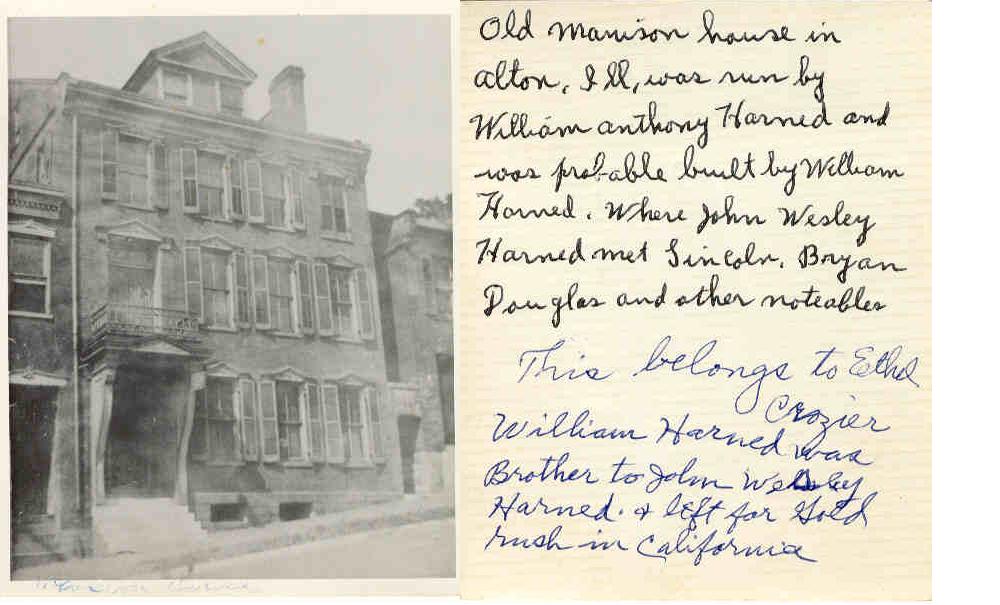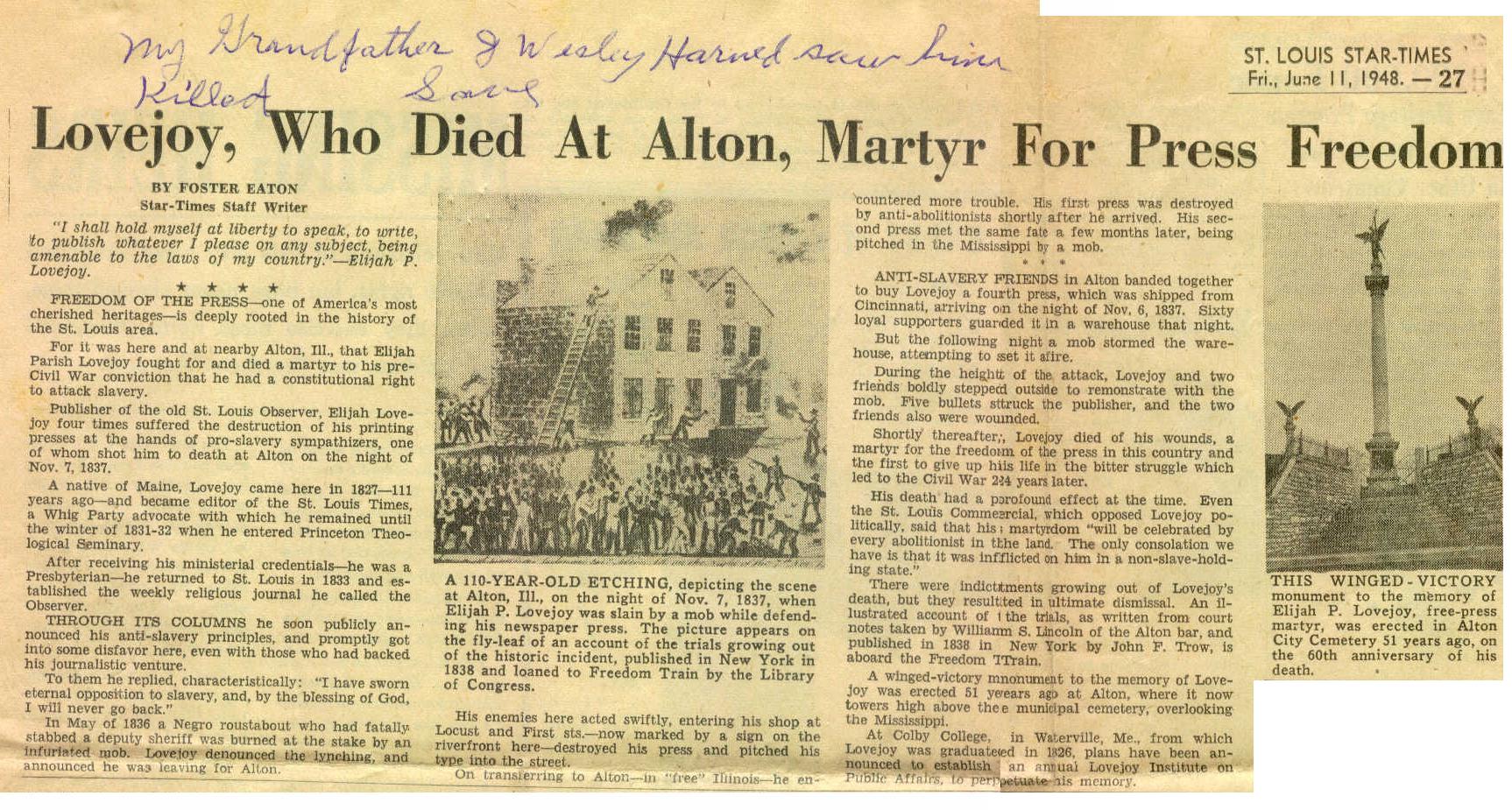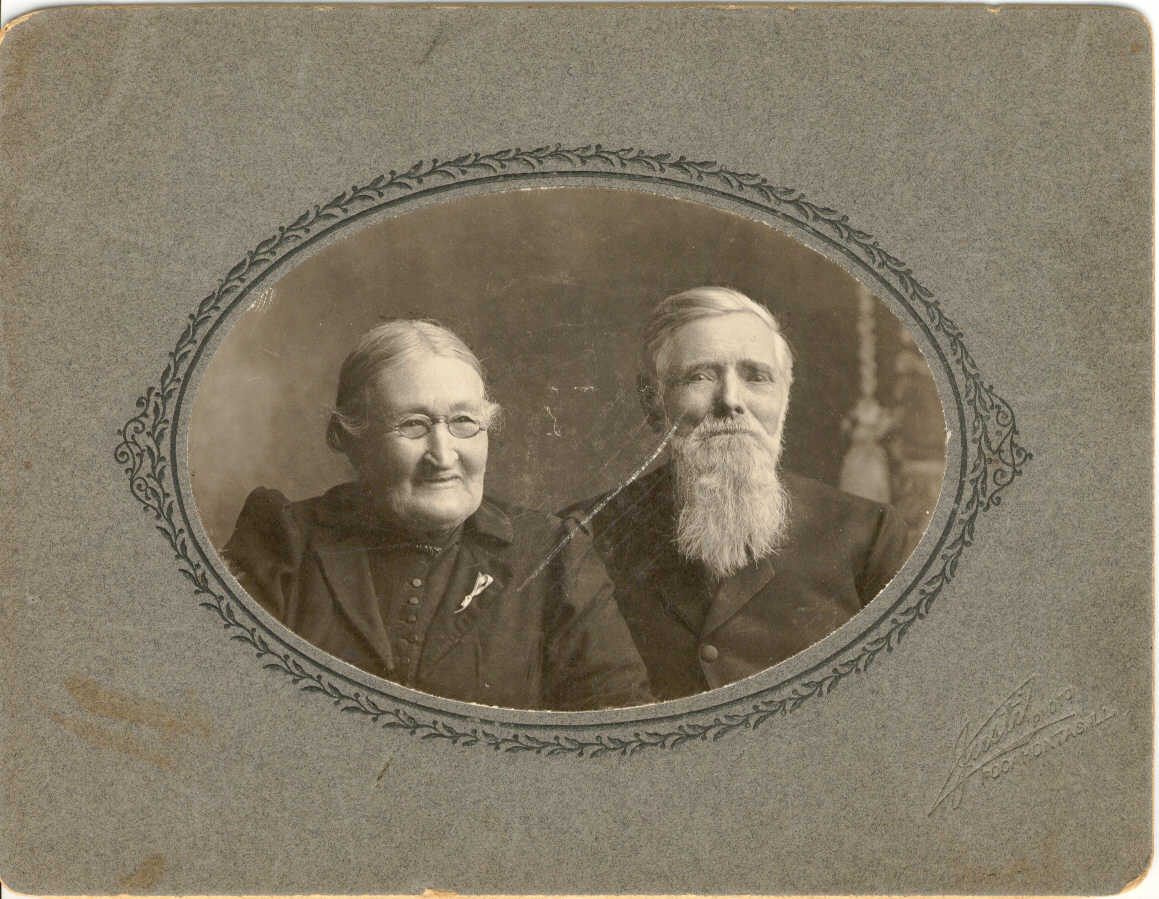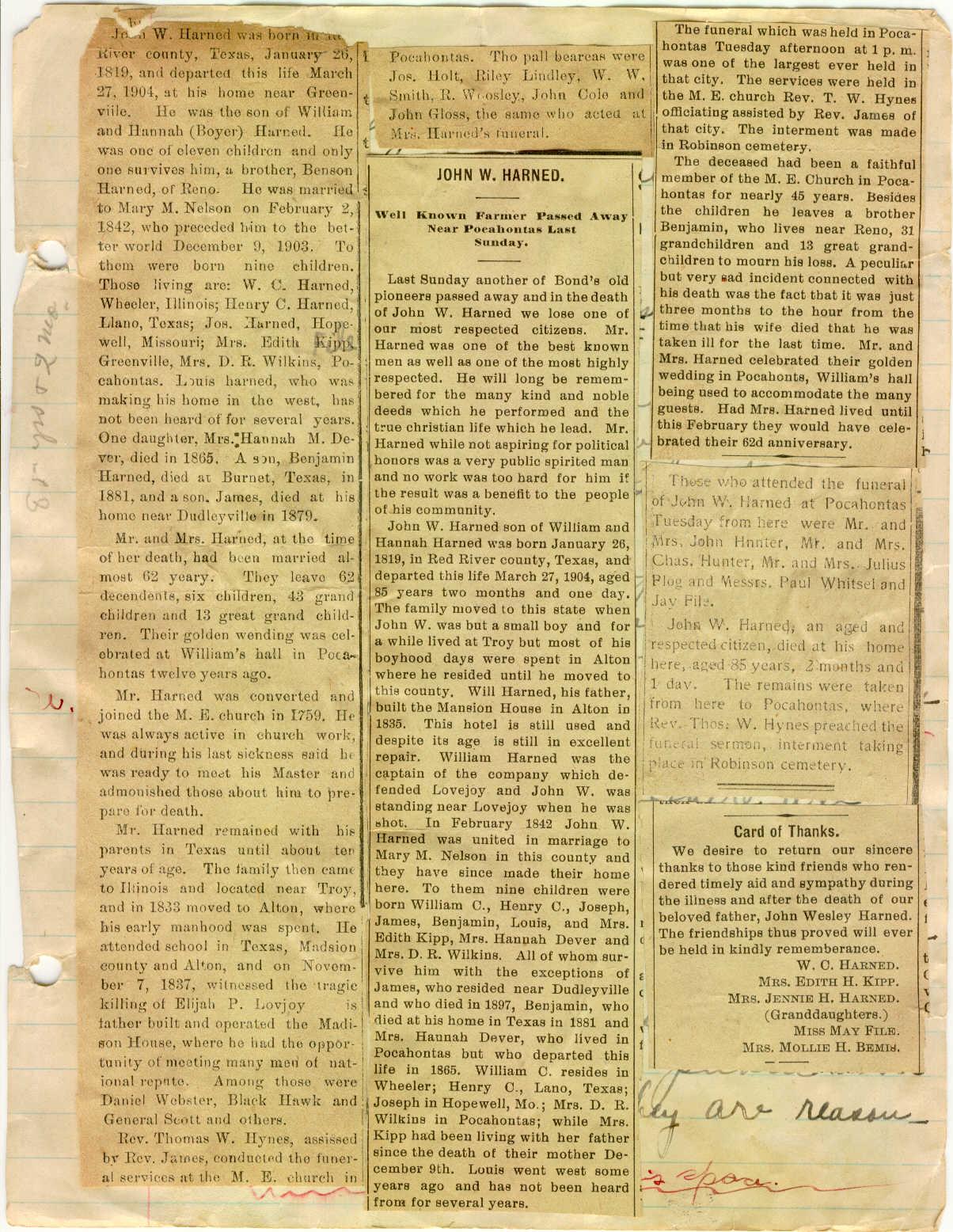
Bond Co, IL USGenWeb
1860 US Census
p 1703
Hhold Name Age Sex Occupation RE Val PP Val Birthplace
John W HARNED 40 M Farmer 3,000 1,200 Texas
Mary M 38 F Illinois
William C 17 M Farm Hand "
Henry C 17 M Farm Hand "
Joseph N 15 M Farm Hand "
Hannah 13 F "
John B 9 M "
Eda R 6 F "
Louis F 4 M "
James N 2 M "
George L SANNER (?) 25 M Laborer France
Following information is from "History of Bond & Montgomery Counties
IL 1882" transcribed by Norma Hass.
John W. HARNED, farmer, P. O. Pocahontas, was born in Red River
County, Tex., January 26, 1819; son of William and Hannah
(BOYER) HARNED, he born in 1792, a Methodist preacher, left the
Yuba River, Cal., October 8, 1850, and was never afterward
heard of. His wife was born in Pennsylvania, in 1792, and died
in November, 1850. They were the parents of eleven children,
seven boys and four girls.
The only education our subject ever had was received in a log cabin,
in the Red River bottoms, where he attended school for a short time.
He first worked on the farm of Williamson PLANT, Bond County, and
has been in the farming business ever since. In Bond County
February 2, 1842, he married Mary M. NELSON, born in Bond County
August 16, 1820, daughter of William and Mary (McLEAN) NELSON.
He has nine children - William C., Henry C., Joseph, Nelson,
Melvina, John B., Eda R., Louis, James M. and Jennie. Mr. HARNED is
a member of the Methodist Church, and his wife has been connected
with the old "Gilead" Cumberland Presbyterian Church for forty-five
years.
He spent the first ten years of his life in what is now Texas, but
which was then part of Mexico, and owing to his constant association
with neighboring Indian tribes, he could speak the Choctaw language
much better than English.
His father was bitterly opposed to slavery; and, during his
residence in the South, suffered many persecutions on account of his
abolitionist principles. He stood by the side of LOVEJOY when he was
shot. He built a hotel in Alton, Ill., in 1833, where our subject
met LINCOLN, DOUGLAS, and many others of the noted men in the early
history of our country. Mr. HARNED was well acquainted with the
famous Black Hawk, chief of the Fox Indians.


from the Alton Observer (November, 1837) Night had come to the town of Alton, Illinois and a crowd began to gather in the darkness. Some of the men stooped to gather stones. Others fingered the triggers of the guns they carried as they made their way to a warehouse on the banks of the Mississippi River. As they approached, they eyed the windows of the three-story building, searching for some sign of movement from inside. Suddenly, William S. Gilman, one of the owners of the building, appeared in an upper window. "What do you want here?" he asked the crowd. "The press!" came the shouted reply. Inside the warehouse was Elijah Parish Lovejoy, a Presbyterian minister and editor of the Alton Observer. He and 20 of his supporters were standing guard over a newly arrived printing press from the Ohio Anti-Slavery Society. This was the fourth press that Lovejoy had received for his paper. Three others already had been destroyed by people who opposed the antislavery views he expressed in the Observer. But Lovejoy would not give up. This time, in an attempt to hide the arrival of the new press, secret arrangements were made. A steamboat delivered the press at 3 o'clock in the morning on November 7, 1837, and some of Lovejoy's friends were there to meet it. Moving quickly, they carried the press to the third floor of Gilman's warehouse, but not before they were spotted by members of the mob. Word of the arrival of the press spread throughout the town all that day. As nightfall approached, mob leaders were joined by men from the taverns, and now the crowd stood below, demanding this fourth press. Gilman called out: "We have no ill feelings toward, any of you and should much regret to do any injury; but we are authorized by the Mayor to defend our property and shall do so with our lives." The mob began to throw stones, breaking out all the windows in the warehouse. Shots were fired by members of the mob, and rifle balls whizzed through the windows of the warehouse, narrowly missing the defenders inside. Lovejoy and his men, returned the fire. Several people in the crowd were hit, and one was killed. "Burn them out!", someone shouted. Leaders of the mob called for a ladder, which was put up on the side of the building. A boy with a torch was sent up to set fire to the wooden roof. Lovejoy and one of his supporters, Royal Weller, volunteered to stop the boy. The two men crept out-side, hiding in the shadows of the building. Surprising the mob, they rushed to the ladder, pushed it over and quickly retreated inside. Once again a ladder was put in place. As Lovejoy and Weller made another brave attempt to overturn the ladder, they were spotted. Lovejoy was shot five times, and Weller was also wounded. Lovejoy staggered inside the warehouse, making his way to the second floor before he finally fell. "My God. I am shot," he cried. He died almost immediately. By this time the warehouse roof had begun to burn. The men remaining inside knew they had no choice but to surrender the press. The mob rushed into the vacant building. The press Lovejoy died defending was carried to a window and thrown out onto the river bank. It was broken into pieces that were scattered in the Mississippi River. Fearing more violence, Lovejoy's friends, did not remove his body from the building until the next morning. Members of the crowd from the night before, feeling no shame at what they had done, laughed and jeered as the funeral wagon moved slowly down the street toward Lovejoy's home. Lovejoy was buried on November 9, 1837, his 35th birthday.

